九年级英语unit12知识点
- 格式:docx
- 大小:31.08 KB
- 文档页数:8
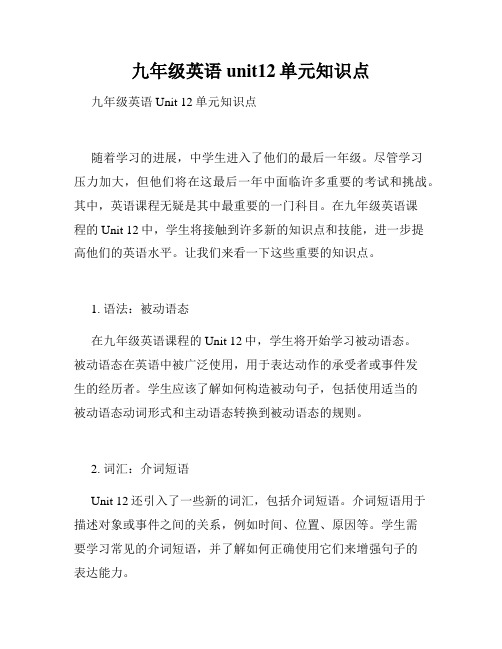
九年级英语unit12单元知识点九年级英语Unit 12单元知识点随着学习的进展,中学生进入了他们的最后一年级。
尽管学习压力加大,但他们将在这最后一年中面临许多重要的考试和挑战。
其中,英语课程无疑是其中最重要的一门科目。
在九年级英语课程的Unit 12中,学生将接触到许多新的知识点和技能,进一步提高他们的英语水平。
让我们来看一下这些重要的知识点。
1. 语法:被动语态在九年级英语课程的Unit 12中,学生将开始学习被动语态。
被动语态在英语中被广泛使用,用于表达动作的承受者或事件发生的经历者。
学生应该了解如何构造被动句子,包括使用适当的被动语态动词形式和主动语态转换到被动语态的规则。
2. 词汇:介词短语Unit 12还引入了一些新的词汇,包括介词短语。
介词短语用于描述对象或事件之间的关系,例如时间、位置、原因等。
学生需要学习常见的介词短语,并了解如何正确使用它们来增强句子的表达能力。
3. 阅读理解:科技与未来英语课程的Unit 12涵盖了科技与未来的主题。
学生将会读到一些与科技和未来发展相关的文章,包括科技创新、环境可持续性等方面的内容。
通过阅读这些文章,学生将进一步培养他们的阅读理解能力,并学会如何从文章中找到关键信息。
4. 写作技巧:写一篇科技发展的短文在Unit 12的写作任务中,学生将被要求写一篇关于科技发展的短文。
他们需要展示对科技发展趋势的理解,并提出自己的观点和看法。
这个任务将帮助学生提高他们的写作技巧,同时培养他们的逻辑思维和表达能力。
5. 口语表达:讨论和辩论在Unit 12的口语任务中,学生将分组进行讨论和辩论。
他们将就科技与未来的话题展开思考,提出自己的观点,并试图说服别人。
这个任务将帮助学生提高他们的口语表达能力,并锻炼他们的团队合作和交流技巧。
总的来说,九年级英语Unit 12提供了丰富的学习内容,包括语法、词汇、阅读理解、写作和口语表达等方面的知识点。
学生需要努力学习和掌握这些知识点,以便在最后一年中取得进一步的提高。

九年级英语unit12笔记Unit 12笔记一、词组1、slap on the wrist 给予轻罚2、pull sth to pieces 拆散3、be close to/nearby 靠近4、take refuge 躲避5、survival instinct 生存本能6、put sth in jeopardy 使…处于危险中7、gain insight 获得洞见二、重点句式1、But one thing is certain — nothing can replace the faith and strength of a mother’s love. 但是有一点可以肯定–没有什么能够取代母爱的信仰与力量。
2、Mother birds can even use the earth’s magnetic field to help guide their babies safely back to the nest. 就连母鸟也能够利用地球的磁场来帮助它们把小鸟安全地引回窝里。
3、What’s more, some mother birds wi ll actively defend their nest from predators. 更有甚者,一些母鸟会有积极地抵抗捕食者以保护自己的巢穴。
三、重点词汇1、predator 猎食者2、instinct 本能3、magnetic 磁的4、challenging 具有挑战性的5、shallow 浅的6、vulnerable 易受伤害的7、protection 防护四、重点短语1、lay eggs 下蛋2、sense danger 感受到危险3、teach to fly 教学飞行4、think twice 三思5、radar system 雷达系统6、give (sb) a hand 帮助(某人)7、hide under 潜藏在…之下。
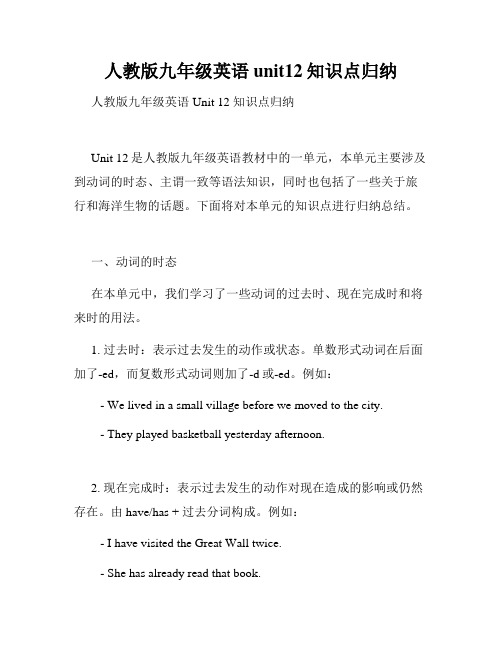
人教版九年级英语unit12知识点归纳人教版九年级英语Unit 12 知识点归纳Unit 12是人教版九年级英语教材中的一单元,本单元主要涉及到动词的时态、主谓一致等语法知识,同时也包括了一些关于旅行和海洋生物的话题。
下面将对本单元的知识点进行归纳总结。
一、动词的时态在本单元中,我们学习了一些动词的过去时、现在完成时和将来时的用法。
1. 过去时:表示过去发生的动作或状态。
单数形式动词在后面加了-ed,而复数形式动词则加了-d或-ed。
例如:- We lived in a small village before we moved to the city.- They played basketball yesterday afternoon.2. 现在完成时:表示过去发生的动作对现在造成的影响或仍然存在。
由have/has + 过去分词构成。
例如:- I have visited the Great Wall twice.- She has already read that book.3. 将来时:表示将来要发生的动作或存在的状态。
由will + 动词原形构成。
例如:- We will go to the beach tomorrow.- They will have a party next week.二、主谓一致主谓一致是指主语和谓语在人称和数上保持一致。
在本单元中,我们需要特别注意以下几点:1. 主语为第三人称单数时,谓语动词需要加-s或-es。
例如:- He often goes to the cinema on weekends.2. 表示时间、距离、金钱等的量词作主语时,谓语动词的单复数形式与它们代表的数量有关。
例如:- Ten yuan is enough to buy a drink.三、旅行话题在本单元中,我们学习了一些与旅行相关的词汇和句型,并通过对话的形式来进行实际应用。

人教版九年级Unit12单词、课文/知识梳理/词汇句式精讲Unit12 单词Unit12 知识梳理【重点短语】1. take a shower洗浴2. leave my backpack at home 把背包忘在家里3. get back to school 返回学校4. start teaching 开始教学5. go off 响铃6. rush out the door 冲出房门7. give sb a lift 捎某人一程8. miss both events 错过两个事件9. full of unexpected 充满着不可预知性10. be about to do sth 正要做某事11. stare in disbelief at 难以置信地盯着。
12. raise above the burning building 从正在燃烧的楼上升起13. jump out of bed 跳下床14. collect the math homework 收数学作业15. complete the work for my boss 完成老板的工作16. make the apple pie 制作苹果馅饼17. show up 赶到,出现18. add the green beans 加绿豆荚【重点句型】1.By the time I got up, my brother had already gotten in the shower. 当我起床时,我哥哥已经进了浴室了。
2.By the time I got outside, the bus had already gone.当我出来时,公汽已经走了。
3.When I got to school, I realized I had left my backpack at home.当我到达学校时,我才意识到我把背包忘在家里了。
4.By the time I walked into class, the teacher had started teaching already.当我走进教室时,老师已经开始讲课了。
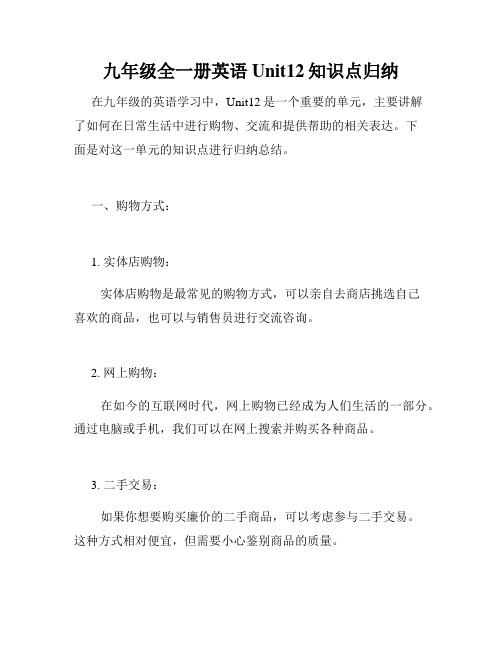
九年级全一册英语Unit12知识点归纳在九年级的英语学习中,Unit12是一个重要的单元,主要讲解了如何在日常生活中进行购物、交流和提供帮助的相关表达。
下面是对这一单元的知识点进行归纳总结。
一、购物方式:1. 实体店购物:实体店购物是最常见的购物方式,可以亲自去商店挑选自己喜欢的商品,也可以与销售员进行交流咨询。
2. 网上购物:在如今的互联网时代,网上购物已经成为人们生活的一部分。
通过电脑或手机,我们可以在网上搜索并购买各种商品。
3. 二手交易:如果你想要购买廉价的二手商品,可以考虑参与二手交易。
这种方式相对便宜,但需要小心鉴别商品的质量。
二、购物时的交流:1. 询问价格:如果你对某个商品感兴趣,可以使用以下表达方式询问价格: - How much is this/that?- How much does it cost?- What's the price?2. 购买商品:当你决定购买某个商品时,可以使用以下表达方式:- I'll take this/that one.- I want to buy this/that one.- I'd like to purchase this/that one.3. 比较商品:在购物时,我们常常需要比较不同商品的特点和价格。
以下表达方式可以帮助你进行比较:- Which one is cheaper, this one or that one?- What's the difference between this one and that one?- I think this one is better because...4. 付款方式:购物时,需要选择合适的付款方式。
以下是常见的付款方式: - Can I pay in cash?- Do you accept credit cards?- Can I use mobile payment like Alipay or WeChat Pay?5. 请求帮助:如果你在购物过程中遇到问题,可以用以下表达方式请求帮助:- Excuse me, can you help me?- Could you please assist me?- I need your help.三、购物中的礼貌用语:1. 感谢和道别:在购物过程中,我们要学会用礼貌的方式表达感谢和道别: - Thank you for your help.- Thanks a lot.- Have a nice day!2. 道歉和请求:如果我们在购物中犯了错或者需要别人帮助,要学会道歉和请求:- I'm sorry for the inconvenience.- Could you please help me with this?- I apologize for the mistake.四、购物时遇到的问题和解决办法:1. 商品不满意:如果购买的商品有质量问题或者与描述不符,可以进行退货或者换货:- I want to return this product because it's broken.- This item is not what I expected. Can I exchange it for another one?- Can I have a refund?2. 付款问题:在付款时可能会出现问题,可以寻求帮助解决:- I'm having trouble with the payment. Can you help me?- My credit card is not working. Is there another way to pay?- The payment machine is not giving me a receipt. What should I do?在Unit12的学习中,我们学到了购物的方式、交流技巧以及解决问题的方法,这些知识对我们日常的生活和未来的职业发展都具有重要意义。

人教版英语九年级上册Unit12 知识点详解Life is full of surprises and unexpected events that can catch us off guard。
We never know what will happen next。
and sometimes it can be XXX。
it is important to stay positive and embrace the unexpected。
as it can lead to new XXX.2.By the time I woke up。
my roommate had already left for work.当我醒来时,我的室友已经去上班了。
解析】by the time意为“在……之前”,表示一个动作在另一个动作之前完成。
典例精讲①_____________________。
the train had already left.(当我到达车站时,火车已经开走了。
)②_____________________。
XXX(到他打完电话时,他已经完成了作业。
)3.I offered to give her a lift to the airport.我主动提出捎她一程去机场。
解析】give…a lift意为“捎(某人)一程”,表示主动提供搭载某人的服务。
典例精讲①Can you _________________________to the train n。
(你能开车送我去火车站吗?)②I___________________________to the supermarket。
(我主动提出开车送她去超市。
)4.The alarm clock went off。
and I rushed out of bed.闹钟响了,我立刻从床上跳起来。
解析】go off意为“响铃”,表示闹钟、警报等声音的响起。
典例精讲①The fire alarm _________________________。

Unit12 Life is full of the unexpected.1. give sb. a lift 捎某人一程(1) 请你捎我一程,好吗?_______________________________________________________________ (2) 他经常捎我去图书馆。
_______________________________________________________________ 参考答案:(1) Could you please give me a life?(2) He often gives me a lift to the library.2. stare /steə/ v.盯着看,凝视n.凝视;注视辨析:stare与look(1)翻译:不要像那样盯着我看。
___________________________________________________________________ (2) Emily ____ the young man hard and finally shamed him into giving up his seatto the old lady.A. stared onB. stared atC. stared forD. stared with参考答案:(1) Don’t stare at me like that.(2) B3. above /əˈbʌv/ prep.在...上面adv.在上面辨析:above,on与over选词填空:above/on/over(1)The plane is flying _____ the clouds.(2)There are five books _____ the desk.(3)There is a bridge _____ the river.(4)I hope the price of the dress will not be____$20.参考答案:(1)above (2)on (3)over (4)above4. burn /bɜ:n/ v.着火;燃烧burn--burnt / burned--burnt / burned辨析:burn, burned与burning(1)翻译:燃烧的旅馆位于城市中心。

初中九年级英语Unit 12知识点资料汇总【重点词组或短语】1.go off响铃2.give sb.a lift捎某人一程3.be about to do sth.正要做某事4.stare in disbelief at难以置信地盯着5.raise above the burning building从正在燃烧的楼上升起6.jump out of bed跳下床7.collect the math homework收数学作业plete the work for my boss完成老板的工作9.show up赶到,出现10.get stressed out紧张起来11.hand in homework交作业12.take place发生13.play all kinds of tricks and jokes开各种玩笑14.sell out卖完,售完15.lose weight减肥16.by the end of that day到那天结束时17.end up以……结束18.get married结婚19.have a happy ending有一个幸福的结局20.fear spread across the whole country恐惧席卷整个国家21.head west向西前进22.in the middle of the road在路中间23.turn around调头、转身24.make an unexpected discovery有一个出人乎意料的发现25.cancel the plan取消计划26.lead to通向27.miss doing sth.错过做某事【重难点句子】1.I was about to go up when I decided to get a coffee first.我正准备上去,这时决定先喝一杯咖啡。
2.As I was waiting in line with other office workers,I hearda loud sound.正当我和其他办公室员工在排队等候时,我听到了一声巨响。

Unit12. Life is full of the unexpected课文知识点详解Section A.1.Life is full of the unexpected. 生活充满了意外。
(标题)【解析1】be full of = be filled with充满,装满【解析2】unexpected adj. 出乎意料的;始料不及的the unexpected “意外的事情”“出乎意料的事”。
the +adj.表示一类人或事物。
英语中,有些形容词与定冠词the连用,表示一类人或事物,在句子中起名词的作用。
the homeless (无家可归者) the disabled(残疾人)2. By the time I got outside, the bus had already left. 当我出来时,公共汽车已经离开了。
(1b)【解析】by the time 在……以前,指从过去的某一点到从句所示的时间为止,常引导表示过去的时间状语从句,主句常用过去完成时,即had+动词过去分词。
By the time I got up, he had already left. 当我起床时,他已经离开了。
【拓展】by now 表示“到现在为止”,通常与现在完成时连用。
By now I have collected 200 dolls. 到现在为止,我已收集了二百个布娃娃。
3. When I got to school, I realized I had left my backpack at home.(1b)当我到学校时我意识到我把书包忘在家里了。
【解析】leave sth. +地点“把某物忘在某处”forget意为“遗忘某物”,指忘记一件具体的东西,但不能有具体的地点。
I left my book on the desk. 我把书忘在了桌子上。
I forgot my umbrella yesterday .我昨天忘了带伞。

初三Unit-12Life-is-full-of-the-unexpected讲解及练习新目标英语九年级Unit 12 Life is full of the unexpected知识点讲与练过去完成时1.概念:过去发生或已经完成的动作对现在造成的影响或结果,或从过去已经开始,持续到现在的动作或状态。
2.时间状语:recently, lately, since…for…,in the past few years, etc.3.基本结构:have/has + done4.否定形式:have/has + not +done.5.一般疑问句:have或has提前概念:过去完成时表示在过去某一时间或动作之前已经发生或完成了的动作,即"过去的过去(past-in-the-past )"。
----|-------------------------- |-------------------------------|---------------------------->那时以前那时现在构成:过去完成时由"助动词had + 过去分词"构成,其中had 通用于各种人称。
They had already had breakfast before they arrived at the hotel.She had finished writing the composition by 10 :00this morning.二、过去完成时的判断依据1. 由时间状语来判定一般说来,各种时态都有特定的时间状语。
与过去完成时连用的时间状语有:( 1 )by + 过去的时间点。
如:I had finished reading the novel by nine o'clock last night.( 2 )by the end of + 过去的时间点。
如:We had learned over two thousand English words by the end of last term.( 3 )before + 过去的时间点。

Unit12. Life is full of the unexpected课文知识点详解Section A.1.Life is full of the unexpected. 生活充满了意外。
(标题)【解析1】be full of = be filled with充满,装满【解析2】unexpected adj. 出乎意料的;始料不及的the unexpected “意外的事情”“出乎意料的事”。
the +adj.表示一类人或事物。
英语中,有些形容词与定冠词the连用,表示一类人或事物,在句子中起名词的作用。
the homeless (无家可归者) the disabled(残疾人)2. By the time I got outside, the bus had already left. 当我出来时,公共汽车已经离开了。
(1b)【解析】by the time 在……以前,指从过去的某一点到从句所示的时间为止,常引导表示过去的时间状语从句,主句常用过去完成时,即had+动词过去分词。
By the time I got up, he had already left. 当我起床时,他已经离开了。
【拓展】by now 表示“到现在为止”,通常与现在完成时连用。
By now I have collected 200 dolls. 到现在为止,我已收集了二百个布娃娃。
3. When I got to school, I realized I had left my backpack at home.(1b)当我到学校时我意识到我把书包忘在家里了。
【解析】leave sth. +地点“把某物忘在某处”forget意为“遗忘某物”,指忘记一件具体的东西,但不能有具体的地点。
I left my book on the desk. 我把书忘在了桌子上。
I forgot my umbrella yesterday .我昨天忘了带伞。
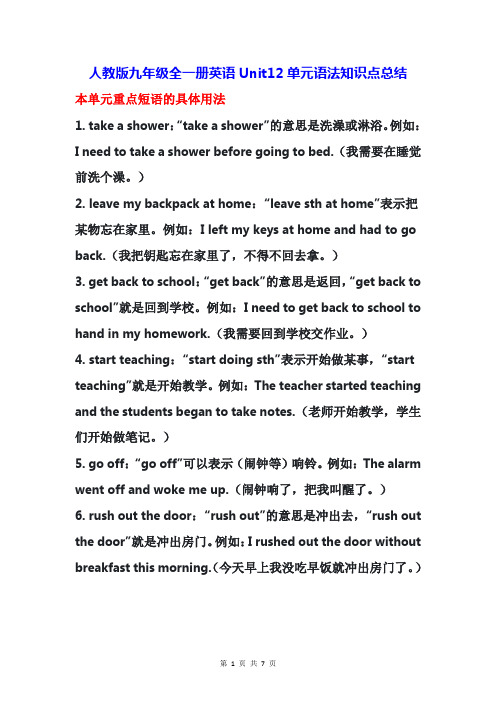
人教版九年级全一册英语Unit12单元语法知识点总结本单元重点短语的具体用法1. take a shower:“take a shower”的意思是洗澡或淋浴。
例如:I need to take a shower before going to bed.(我需要在睡觉前洗个澡。
)2. leave my backpack at home:“leave sth at home”表示把某物忘在家里。
例如:I left my keys at home and had to go back.(我把钥匙忘在家里了,不得不回去拿。
)3. get back to school:“get back”的意思是返回,“get back to school”就是回到学校。
例如:I need to get back to school to hand in my homework.(我需要回到学校交作业。
)4. start teaching:“start doing sth”表示开始做某事,“start teaching”就是开始教学。
例如:The teacher started teaching and the students began to take notes.(老师开始教学,学生们开始做笔记。
)5. go off:“go off”可以表示(闹钟等)响铃。
例如:The alarm went off and woke me up.(闹钟响了,把我叫醒了。
)6. rush out the door:“rush out”的意思是冲出去,“rush out the door”就是冲出房门。
例如:I rushed out the door without breakfast this morning.(今天早上我没吃早饭就冲出房门了。
)7. give sb a lift:“give sb a lift”的意思是让某人搭车、捎某人一程。
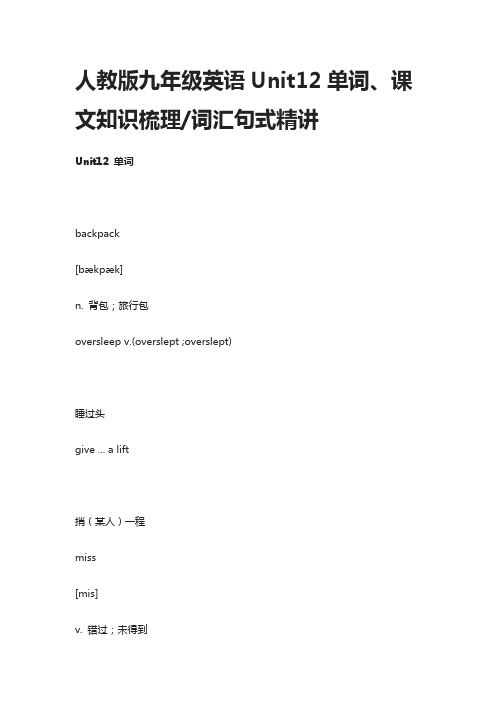
人教版九年级英语Unit12单词、课文知识梳理/词汇句式精讲Unit12 单词backpack[bækpæk]n. 背包;旅行包oversleep v.(overslept ;overslept)睡过头give ... a lift捎(某人)一程miss[mis]v. 错过;未得到unexpected[ʌnikspektid]a.出乎意料的;始料不及的block[blɔk ]n. 街区worker[wə:(r)kə(r)]n. 工作者;工人stare[steə]v. 盯着看;凝视disbelief[disbili:f]n. 不信;怀疑above[ əbʌv]adv. 在上面;向上面pre在上面burn[bə:(r)n]v. (burnt; burned ) 着火;燃烧alive[ əlaIv]adj. 活着;有生气的take off(飞机等)起飞;匆忙离开till[til]conj. & pre到;直到west[west]adv. 向西;朝西adj. 向西的;西部的n. 西;西方cream[kri:m]n. 奶油;乳脂boss[bɔs]n. 老板;领导pie[pai]n. 果馅饼;果馅派course[kɔ:(r)s]n. 课程bean[bi:n]n. 豆;豆荚[ma:(r)kit]n. 市场;集市costume[kɔstju:m]n.服装;装束embarrassed [imbærəst] adj.窘迫的;害羞的announce[ ənauns]v. 宣布;宣告spaghetti[spəgeti]n. 意大利面条hoaxn. 骗局;恶作剧discovery[diskʌvəri]n. 发现;发觉lady[leidi]n. 女士;女子officer[ ɔfisə]n.军官;官员believable[bili:vəbl]adj.可相信的;可信任的embarrassing[imbærəsiŋ]a. 使人害羞的(难堪的或惭愧的)New Zealand[nju:zi:lənd]新西兰Italy[Itəli]意大利Mars[ma:(r)z]火星Carl[ka:(r)l]卡尔(男名)OrsonWelles[ɔ:(r)sən; welz]奥森•韦尔斯Unit12 知识梳理【重点短语】1. take a shower洗浴2. leave my backpack at home 把背包忘在家里3. get back to school 返回学校4. start teaching 开始教学5. go off 响铃6. rush out the door 冲出房门7. give sb a lift 捎某人一程8. miss both events 错过两个事件9. full of unexpected 充满着不可预知性10. be about to do sth 正要做某事11. stare in disbelief at 难以置信地盯着。
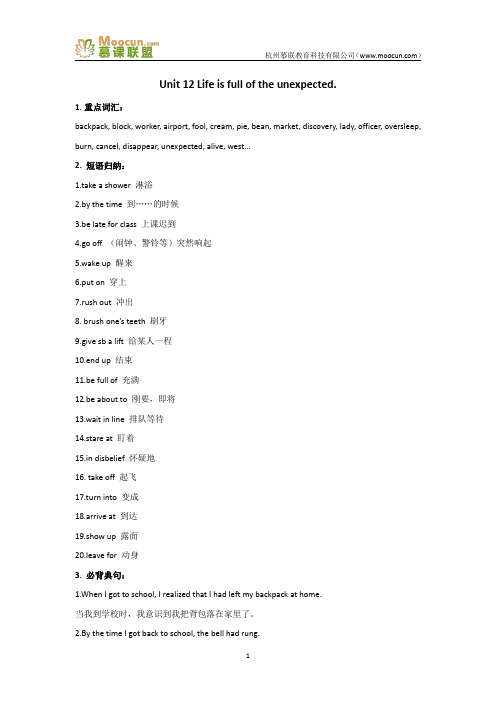
Unit 12 Life is full of the unexpected.1.重点词汇:backpack, block, worker, airport, fool, cream, pie, bean, market, discovery, lady, officer, oversleep, burn, cancel, disappear, unexpected, alive, west...2. 短语归纳:1.take a shower 淋浴2.by the time 到……的时候3.be late for class 上课迟到4.go off (闹钟、警铃等)突然响起5.wake up 醒来6.put on 穿上7.rush out 冲出8. brush one’s teeth 刷牙9.give sb a lift 给某人一程10.end up 结束11.be full of 充满12.be about to 刚要,即将13.wait in line 排队等待14.stare at 盯着15.in disbelief 怀疑地16. take off 起飞17.turn into 变成18.arrive at 到达19.show up 露面20.leave for 动身3. 必背典句:1.When I got to school, I realized that I had left my backpack at home.当我到学校时,我意识到我把背包落在家里了。
2.By the time I got back to school, the bell had rung.当我回到学校时,铃声已经响了。
3. Before I got to the bus stop, the bus had already left.在我到达公共汽车站之前,公共汽车已经开走了。
4. As I was waiting in the line with the other office workers, I heard a loud sound.当我和其他办公室工作人员在排队的时候,我听到了一个很大的声音。

⼈教版九年级英语第⼗⼆单元Unit12知识点+习题Unit12 Life is full of the unexpected 知识点回顾⼀、重点短语:1.be full of...2. take a shower3. by the time4. leave sth. + 介词短语5. keep doing sth.6.go off7. wake up8. put on9. rush out10. give ... a lift11. at least12. arrive at / in13. be about to do sth.14. in line with15. take off16. in disbelief17. turn into18. hear about19. forget to do sth.20. finish doing sth.21. stay up22. take place23. play tricks on sb.24. no more25. sell out26. lose weight27. get married28. end up29. hundreds of30. run away⼆、考点回顾:1.Life is full of the unexpected.【解析1】be full of = be filled with充满,装满①Our life is ______________chances, but there are also a lot of challenges.(充满)②The box is_______________(装满) books.③On hearing the news, her heart was _____ gratitude.A.filled ofB. full withC. filled withD. fill with【2014辽宁丹东】—Look! Here comes Cindy! She is always full of .—So she is. because she takes a lot of exercise every day.A. knowledgeB. courageC. changeD. energy【解析2】unexpected adj. 出乎意料的;始料不及的the unexpected “意外的事情”“出乎意料的事”。

Unit 12 Life is full of the unexpected.1.重点词汇:backpack, block, worker, airport, fool, cream, pie, bean, market, discovery, lady, officer, oversleep, burn, cancel, disappear, unexpected, alive, west...2. 短语归纳:1.take a shower 淋浴2.by the time 到……的时候3.be late for class 上课迟到4.go off (闹钟、警铃等)突然响起5.wake up 醒来6.put on 穿上7.rush out 冲出8. brush one’s teeth 刷牙9.give sb a lift 给某人一程10.end up 结束11.be full of 充满12.be about to 刚要,即将13.wait in line 排队等待14.stare at 盯着15.in disbelief 怀疑地16. take off 起飞17.turn into 变成18.arrive at 到达19.show up 露面20.leave for 动身3. 必背典句:1.When I got to school, I realized that I had left my backpack at home.当我到学校时,我意识到我把背包落在家里了。
2.By the time I got back to school, the bell had rung.当我回到学校时,铃声已经响了。
3. Before I got to the bus stop, the bus had already left.在我到达公共汽车站之前,公共汽车已经开走了。
4. As I was waiting in the line with the other office workers, I heard a loud sound.当我和其他办公室工作人员在排队的时候,我听到了一个很大的声音。

九年级英语第12单元笔记以下是九年级英语第12单元的笔记:1. 重点单词和短语:dynasty 朝代emperor 皇帝palace 宫殿rare 稀有的valuable 有价值的collection 收藏品exhibition 展览coin 硬币painting 画作masterpiece 杰作literature 文学globe 地球仪philosophy 哲学2. 重点句型:How can I help you? 我能帮你什么吗?What can I do for you? 我能为你做点什么吗?There are three main steps in the process of writing a business letter. 写商业信函有三大主要步骤。
3. 重点语法:现在完成时态(Present Perfect Tense)的用法。
现在完成时态表示过去发生的动作对现在的影响或结果,或者过去的动作一直持续到现在。
其基本结构是“have/has +过去分词”。
例如:I have studied English for three years. 我已经学了三年的英语。
4. 阅读理解:本单元的阅读文章介绍了中国的故宫,讲述了故宫的历史、建筑风格和珍贵文物等内容。
通过阅读文章,可以了解中国历史和文化,提高阅读能力和词汇量。
5. 写作练习:本单元的写作练习是写一封商业信函。
通过写作练习,可以掌握商业信函的写作技巧和格式,提高写作能力。
6. 听力练习:本单元的听力练习是听一段对话,然后回答问题。
通过听力练习,可以提高听力和口语能力,同时学习日常生活中的实用表达方式。
7. 课堂活动:本单元的课堂活动是小组讨论,讨论的话题是“保护文化遗产”。
通过小组讨论,可以培养团队合作和交流能力,同时增强保护文化遗产的意识。
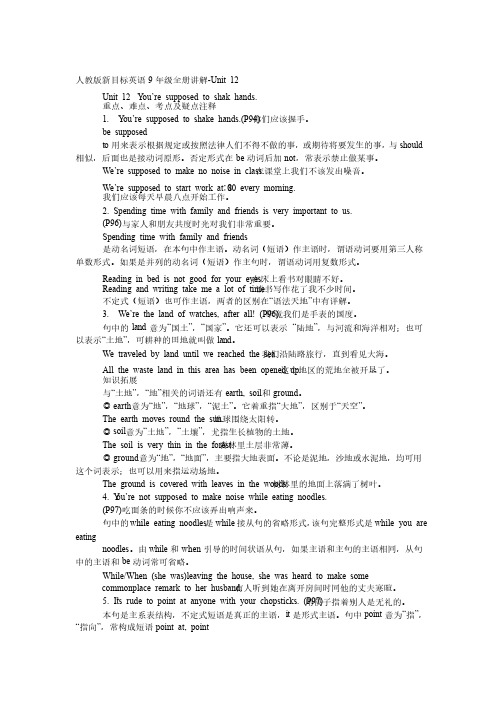
人教版新目标英语9年级全册讲解-Unit 12 Unit 12 Y ou’re supposed to shak hands. 重点、难点、考点及疑点注释重点、难点、考点及疑点注释1. Y ou’re supposed to shake hands.(P94)你们应该握手。
你们应该握手。
be supposed to 用来表示根据规定或按照法律人们不得不做的事,或期待将要发生的事,与should 相似,后面也是接动词原形。
否定形式在be 动词后加not ,常表示禁止做某事。
,常表示禁止做某事。
We’re supposed to make no noise in class. 在课堂上我们不该发出噪音。
在课堂上我们不该发出噪音。
We’re supposed to start work at 8∶00 every morning. 我们应该每天早晨八点开始工作。
我们应该每天早晨八点开始工作。
2. Spending time with family and friends is very important to us. (P96)与家人和朋友共度时光对我们非常重要。
与家人和朋友共度时光对我们非常重要。
Spending time with family and friends 是动名词短语,在本句中作主语。
动名词是动名词短语,在本句中作主语。
动名词(短语)作主语时,谓语动词要用第三人称(短语)作主语时,谓语动词要用第三人称单数形式。
如果是并列的动名词(短语)作主句时,谓语动词用复数形式。
单数形式。
如果是并列的动名词(短语)作主句时,谓语动词用复数形式。
Reading in bed is not good for your eyes. 在床上看书对眼睛不好。
在床上看书对眼睛不好。
Reading and writing take me a lot of time. 读书写作花了我不少时间。
读书写作花了我不少时间。
九年级英语Unit12《Life is full of the unexpected.》知识点本单元语法:过去完成时。
过去完成时表示在过去某一时间点以前即“过去的过去”已经发生的动作。
Mr. Black told me that he had seen the movie three times.⑴过去完成时表示在过去某一时间或动作之前已经发生或完成的动作。
它表示动作发生的时间是“过去的过去”。
⑵过去完成时的结构是:肯定由“助动词had(用于各种人称和数) + 过去分词”构成否定式:had not + 过去分词缩写形式:hadn’t⑶过去完成时的时间状语:①表示过去某一时间可用by, before等构成的短语。
by the time by the end ofWe had finished our homework before 10 o’clock.②可能通过when, before等引导的从句表示。
When I got there, the train had left.③过去某一时间通过上下文来表示。
Kate hadn’t studied hard, so she didn’t pass the exam yesterday.1. unexpected adj. 出乎意料的;始料不及的expect v. expect/wish sb. to do sth.期盼某人做某事the unexpected “意外的事情”“出乎意料的事”。
the +adj.表示一类人或事物。
the homeless (无家可归者) the disabled(残疾人)the wounded(战争中受伤的人) the injured(事故中受伤的人)2.by the time+时间状语从句(1)时间状语从句的时态是一般现在时时(表示将来),主句用将来完成时;(2)时间状语从句是一般过去式时,主句用过去完成时。
by the end of +时间点(1)+过去的时间点,主句用过去完成时;(2)+将来的时间点,主句用将来完成时;by+时间点(1)+现在的时间点,主句用现在完成时;(2)+过去的时间点,主句用过去完成时;(3)+将来的时间点,主句用将来完成时。
By the time you came back, I had finished this book.By the time Jane gets home, her aunt will have left for Beijing.By the end of last year, I had stayed in Xinzheng for seven years.By now, I have finished all my homework.3.oversleep =sleep late v 睡过头sleep → slept → slept oversleep—overslept—overslept–What happened ? — I _____.A. oversleepB. oversleepedC. overslept4. give sb. a lift =give sb. a ride / give a rid e to sb. “捎某人一程”,The poor old woman was standing in the middle of the road and asked someone to ___.A. give him a rideB. give her a rideC. enjoy a rideD. accept a ride5.leave 与forget的用法:(1) leave “ 遗留,落下,忘记带”,侧重指把某物或某人留在某个地方,后常跟地点状语;(2)forget “ 忘记”,侧重指忘记某件事情,后常跟to do (忘了要去做)或doing (忘了做过)。
remember todo remember doing♦leave → left → left v 离开(1)leave sth +地点把某物遗忘在某地(2)leave for +地点(目的地) 离开去某地(3) leave a message 留言ask for leave 请假leave school (中学) 毕业(4)leave one by oneself=leave sb. alone 把某人单独留下6.when的特殊用法“这时,突然”,用于四种结构1)be doing sth...whenI was thinking of this when I heard my name called.2)be on the point of doing sth...whenShe was on the point of going out when the telephone rang3)be about to do sth...when We were about to start when it began to rain.4).sb. had hardly/scarcely/barely done sth... whenWe had hardly fallen asleep when the bell rang.另:be about to 忙于;即将做某事。
侧重于表示动作马上就要发生,常与when引导的从句连用,但不与具体的时间状语连用。
7.be full of = be filled with充满,装满fill…with..The basket is full of apples. = The basket is filled with apples.8.get/go/come/be back to school=return to school意为“回到学校”1)get back to 后接表地点的名词,意为“回到某地”;2)get back to 后面接人,可引申为“回复某人的信件,电子邮件,电话”等;3)get back 还可表示“ 回来,返回,拿回,取回”等含义。
4)give back=return归还9.My alarm clock didn’t go off!go off 发出响声, (闹钟)闹响The alarm went off just now.go over 复习go away 离开go by (时间)过去go for a walk 出去散步go on 继续go + doing 去做某事go fishing/shopping/skating/swimming去钓鱼/去买东西/去溜冰/去游泳10.rush out 冲出去,冲出…… wait in line w ith 意为“与……排队等候”stand in line 站成一排cut in line 插队stare at 凝视in disbelief 不相信turn/change into 变land on 意为“着陆;降落于”be late for迟到keep doing sth 一直做......wake up 醒来wake-woke-woken11.even if / even though/ though/although 都可以引导让步状语从句。
Even if =even though“即使、纵然”引出的从句叙述的是假设或把握很大的事情though“虽然”,引出的从句叙述的是事实。
I will try even if I may fail.Though it was very late, he went on working.[注] though 和but 不能同时出现在句中。
12.above1)prep(表示位置)在…正上方;(与below相对)The moon is now above the trees.2)prep表示在地位、级别、能力、资历、重要性等方面“超过”He is above me in every way.3) adv. “在上面; 在上文”。
See the examples given above.2000 meters above the sea level 海拔2000米13.alive, living, live与livelylively1)live “活着的”,通常指物,不指人,常用来作定语放名词的前面。
还指“实况转播的”。
例如:a live fish 一条活鱼。
Do you like a live show or a recorded show ?2)living意为“活着”强调说明“尚在人间”,“健在”,可用来指人或物,作定语或表语。
例如:.My first teacher is still living . English is a living language .A living language should be learned through listening and speaking .He is regarded as one of the best living writers at present .注意:living 前加上the , 表示类别,指“活着的人们”。
例如:The living must finish the work of those dead .living 还可用于短语,例如:make a living by doing谋生。
3)alive 意为“活着”,侧重说明生与死之间的界限(本来会死但没有死),既可指人,也可指物;可用来作表语,后置定语或宾补。
例如:He is dead , but his dog is still alive .He wanted to keep the fish alive.This is a fish alive.4)lively 则意为“活泼的”,“活跃”,“充满生气的”,可作定语、表语或宾补,既可指人,又可指物。
例如:Jenny is a lively girl . Everything is lively here . 这儿一切都生机勃勃。
He had a strange way of making his classes lively and interesting .live 物定语现场的living 人/物定语、表语 Make a living/the livingalive 人/物后置定语、表语、宾补生与死的界限lively 人/物定语、表语、宾补生气勃勃的,无活着的意思1). Jin Yong is one of the greatest and oldest writer. He is still .A. living; aliveB. living; livingC. alive; livingD. alive; lively2).—Is his grandmother still ?—Yes, she is 102 years old!A. liveB. livingC. aliveD. Lively14.take off 在此句中意为“起飞”,off 在此为副词表示“离开;走开”。